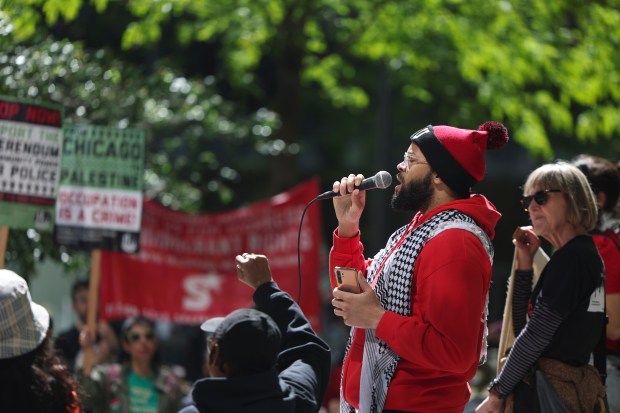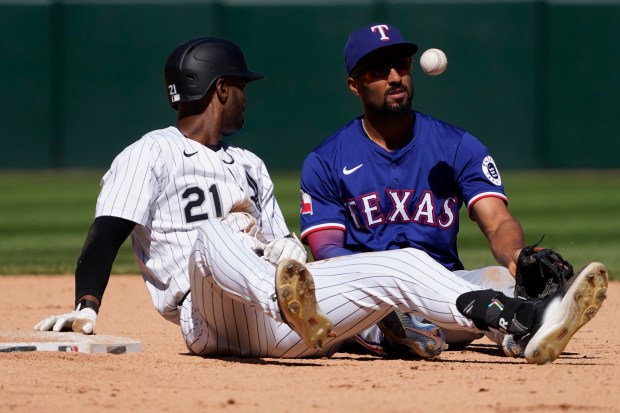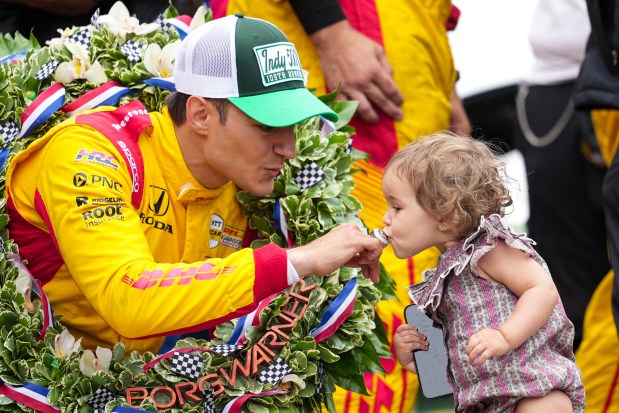On the morning of the final day of the Democratic National Convention, Chicago police Superintendent Larry Snelling and other law enforcement officials once again credited their unified approach to securing the proceedings while allowing for demonstrators to exercise their free speech rights.
But there’s one night to go. Another protest — to be held as Vice President Kamala Harris officially accepts the party’s nomination — is set for Thursday evening.
As he has throughout his tenure as leader of CPD, Snelling praised the collaborative spirit between the police department and other law enforcement agencies assigned to the DNC. Wednesday’s demonstrations, the least combative of the week thus far, ended with no arrests or injuries.
The superintendent praised demonstration organizers’ efforts to curb potential bad actors and for keeping in contact with police.
“It shows that when you have some type of contact and collaboration with those who are organizing, that you can have a peaceful First Amendment gathering, and that’s what happened yesterday,” Snelling said.
CPD officers assigned to the protests — who’ve seen their days off canceled and their shifts extended — have far outnumbered demonstrators throughout each of the first three days of the DNC. One reporter asked Snelling to respond to claims by some pro-Palestinian organizers that the sheer number of CPD officers was an intimidation tactic.
“Personal feelings, you know, we’re concerned about that, but not as concerned as we are for the safety of the city,” Snelling said. “What we want to do is get people to understand that we’re out there for their safety, and I do believe that that was proven.
“Now they may feel like it was intimidating because they saw so many officers, and that can be intimidating to anybody, but the way that the officers responded is proof that, because they didn’t stop anyone from protesting or exercising their First Amendment rights, so it’s proof that officers were out there for protection,” he added.
Smaller, unorthodox acts of protest popped up, as well. Protesters gathered outside a downtown hotel overnight in an apparent effort to make enough noise to wake up Harris; no arrests were made and Snelling on Thursday said he was not aware of the action.
“If it were something that was serious, obviously we would have that information,” he said. “There are protesters that show up everywhere all over the city.”
Meanwhile, someone apparently put insects in the food at a delegate breakfast Wednesday morning, an incident that Snelling said is under investigation by local and federal authorities.
One person appeared to have gotten sick as a result, Snelling said. While the bugs were initially believed to be maggots, Snelling said it is more likely the contaminants were sawdust and mealworms.
Police also are still investigating a report that a DNC delegate was robbed at gunpoint in the West Loop, Snelling said.
“We’re still looking a little deeper into that, to get more information,” he said.
Though the DNC will wrap up Thursday, there is a possibility that the barrier fences erected around the United Center might stay up a little longer.
“We’ll assess what’s going on, and as soon as we have the green light, we’ll start breaking things down,” Snelling said.
While demonstrations Wednesday were peaceful, there have been dozens of arrests over the convention’s first three days. Three people in total have faced felony charges during that time.
Most of those arrested were detained Tuesday night during a protest at the Israeli consulate on west Madison Street. That demonstration ended with a group tussling with police officers.
Still, most of those charged have not appeared before a judge. Most of those detained at the consulate were cited and released. One was hit with a felony count of resisting a police officer.
Police said 44 people were issued citations for disorderly conduct. Three more were cited for resisting.
The three people to be charged with felonies in connection with DNC demonstrations so far included one man who prosecutors said headbutted a police officer causing the officer to suffer a concussion.
Two of the felony arrests occurred following the breach of fencing Monday afternoon at the perimeter of the convention site.
An 18-year-old man was charged with felony resisting arrest and aggravated battery to an officer after prosecutors said he struggled with an officer Monday, causing him to fall and hit his head. He appeared before a judge Tuesday night for the only detention hearing thus far, though the judge denied prosecutors request to hold him in jail and instead ordered electronic monitoring.
His hearing was delayed for hours because he refused to give his name, prosecutors said.
A 31-year-old man was also charged with a felony in connection with the fence breach. Prosecutors said he threw liquid that hit an officer, then threw a crumpled plastic bottle in the officer’s direction, hitting a fence.
One person was charged with a felony in connection with the protests at the Israeli consulate. The 33-year-old Crystal Lake man was charged with felony count of resisting arrest along with other misdemeanors.
As police tried to detain him, prosecutors said, he lowered his head and shoulders and hit an officer, causing the officer to be injured.
Prosecutors also said he was observed with a stolen police radio and paint can. A judge ordered him released from custody with some supervisory conditions.
The last march of the convention is scheduled for 5 p.m. The Coalition to March on the DNC, an agglomeration of groups, will be back in Union Park on Lake Street to coincide with convention activities that will culminate with the keynote speech from Harris, her party’s nominee for president.
The group led a march Monday that ended with the small band of protesters briefly breaching the fencing perimeter near the United Center.
The lead group’s focus has been a push to stop U.S. aid to Israel. The demonstration is expected to begin again with speeches in the park, a march to Park 578 near the convention site, and then a loop back to Union Park.
“We chose the end of the day to coincide” with the culmination of the convention, said Hatem Abudayyeh, a march planner and spokesman for the pro-Palestinian coalition.
The first iteration of the march saw about 3,000 protesters, far below the hopes of organizers who called for some 20,000 to appear on city streets. The organization has disputed the number.
Wednesday night’s rally was organized by the Chicago-based Coalition for Justice in Palestine and did not have a permit from the city. It drew about 600 demonstrators.
Tribune reporters Nell Salzman, Caroline Kubzansky and Jake Sheridan contributed to this report.
This is a developing story. Please check back for updates.





